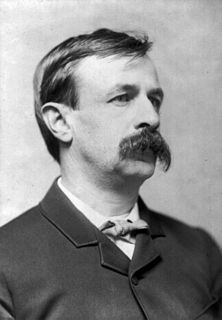A Quote by Hugh Miller
Nature is a vast tablet, inscribed with signs, each of which has its own significancy, and becomes poetry in the mind when read; and geology is simply the key by which myriads of these signs, hitherto indecipherable, can be unlocked and perused, and thus a new province added to the poetical domain.
Related Quotes
I had fallen in love. What I mean is: I had begun to recognize, to isolate the signs of one of those from the others, in fact I waited for these signs I had begun to recognize, I sought them, responded to those signs I awaited with other signs I made myself, or rather it was I who aroused them, these signs from her, which I answered with other signs of my own . . .
Combining in our survey then, the whole range of deposits from the most recent to the most ancient group, how striking a succession do they present:- so various yet so uniform-so vast yet so connected. In thus tracing back to the most remote periods in the physical history of our continents, one system of operations, as the means by which many complex formations have been successively produced, the mind becomes impressed with the singleness of nature's laws; and in this respect, at least, geology is hardly inferior in simplicity to astronomy.
The world is very complicated and it is clearly impossible for the human mind to understand it completely. Man has therefore devised an artifice which permits the complicated nature of the world to be blamed on something which is called accidental and thus permits him to abstract a domain in which simple laws can be found.
The signs that presage growth, so similar, it seems to me, to those in early adolescence: discontent, restlessness, doubt, despair, longing, are interpreted falsely as signs of decay. In youth one does not as often misinterpret the signs; one accepts them, quite rightly, as growing pains. One takes them seriously, listens to them, follows where they lead. ... But in the middle age, because of the false assumption that it is a period of decline, one interprets these life-signs, paradoxically, as signs of approaching death.
When we rise out of [the night] into the new life and there begin to receive the signs, what can we know of that which - of him who gives them to us? Only what we experience from time to time from the signs themselves. If we name the speaker of this speech God, then it is always the God of a moment, a moment God.
The most dangerous lovers women have are men of Cordis's feminine temperament. Such men, by the delicacy and sensitiveness of their own organizations, read women as easily and accurately as women read each other. They are alert to detect and interpret those smallest trifles in tone, expression, and bearing, which betray the real mood far more unmistakably than more obvious signs.
Works of imagination excel by their allurement and delight; by their power of attracting and detaining the attention. That book is good in vain which the reader throws away. He only is the master who keeps the mind in pleasing captivity; whose pages are perused with eagerness, and in hope of new pleasure are perused again; and whose conclusion is perceived with an eye of sorrow, such as the traveller casts upon departing day.





































